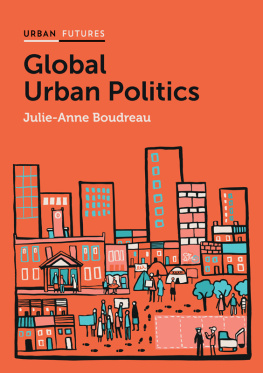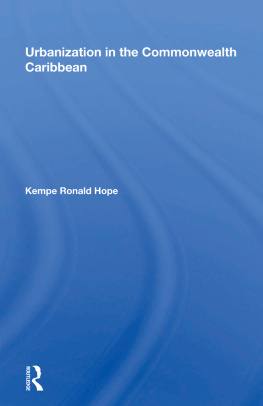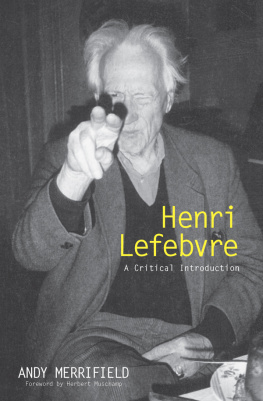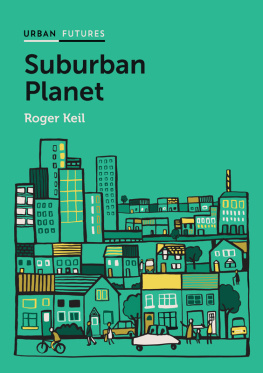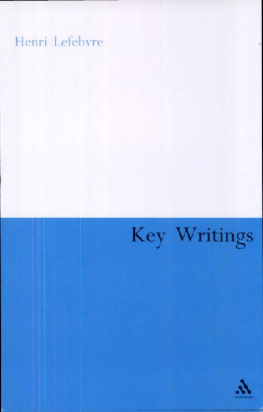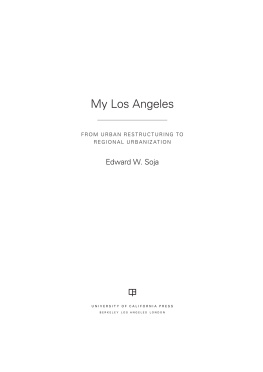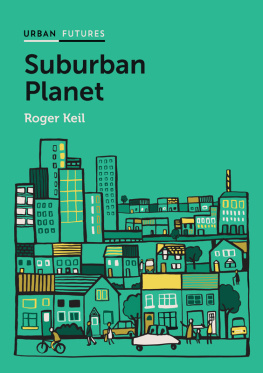The Politics of the Encounter
GEOGRAPHIES OF JUSTICE AND SOCIAL TRANSFORMATION
SERIES EDITORS
Deborah Cowen, University of Toronto
Nik Heynen, University of Georgia
Melissa W. Wright, Pennsylvania State University
ADVISORY BOARD
Sharad Chari, London School of Economics
Bradon Ellem, University of Sydney
Gillian Hart, University of California, Berkeley
Andrew Herod, University of Georgia
Jennifer Hyndman, York University
Larry Knopp, University of Washington, Tacoma
Heidi Nast, DePaul University
Jamie Peck, University of British Columbia
Frances Fox Piven, City University of New York
Laura Pulido, University of Southern California
Paul Routledge, University of Glasgow
Bobby Wilson, University of Alabama
The Politics of the Encounter
URBAN THEORY AND PROTEST UNDER PLANETARY URBANIZATION
ANDY MERRIFIELD

Publication of this work was made possible, in part, by a generous gift from the
University of Georgia Press Friends Fund.
2013 by the University of Georgia Press
Athens, Georgia 30602
www.ugapress.org
All rights reserved
Set in Minion and Trade Gothic by Graphic Composition, Inc., Bogart, GA.
Printed digitally
Library of Congress Cataloging-in-Publication Data
Merrifield, Andy.
The politics of the encounter : urban theory and protest under planetary urbanization / Andy Merrifield.
pages cm. (Geographies of justice and social transformation ; 19)
Includes bibliographical references and index.
ISBN-13: 978-0-8203-4529-1 (hardcover : alk. paper)
ISBN-10: 0-8203-4529-6 (hardcover : alk. paper)
ISBN-13: 978-0-8203-4530-7 (pbk. : alk. paper)
ISBN-10: 0-8203-4530-X (pbk. : alk. paper)
1. Sociology, Urban. 2. Urbanization. 3. Social justice. 4. Lefebvre, Henri, 19011991. I. Title.
HT151.m445 2013
307.76dc23
2012046528
British Library Cataloging-in-Publication Data available
ISBN for digital edition: 978-0-8203-4581-9
To the memory of Herbert Muschamp, 19472007
At every moment of the encounter, I discover in the other another myself: You like this? So do I! You dont like that? Neither do I!
Roland Barthes
Yet is no body present here which was not there before. Only is order othered.
James Joyce
CONTENTS
PREFACE
The Personal and the Political
A Different Kind of Blue
The late Herbert Muschamp, onetime columnist at the New York Times, once suggested my and Henri Lefebvres work on the city sprang from a variation of what psychoanalyst Melanie Klein called the depressive position. Muschamp was one of Americas most influential (and controversial) architectural critics, a brilliant, exuberant urban commentator, a chip off Lefebvres own block. He and I became friends in 2002, around the time of the publication of my books Metromarxism and Dialectical Urbanism, although after Id relocated to France it was more often a fellow-traveler kind of thing, a friendship across a divide of water, ideology, and time. When I asked Muschamp to write a foreword to my book on Lefebvre, he happily complied. It was in that foreword that he embarrassingly threw me into the same bag as our greatest philosopher of the city, the French Marxist Lefebvre.
Muschamp died from lung cancer in 2007. He was fifty-nine. His death created a gaping hole in U.S. urbanism. A rare voice was silenced, a cosmopolitan and romantic voice for whom the city meant, above all, freedompolitical and sexual freedom. Muschamp was pained whenever he saw those freedoms taken away. He loved New York yet wasnt afraid to condemn the city, to correct popular misconceptions: that it was an island off an island, imagining itself a liberal stronghold when, Muschamp insisted, the record strongly indicated the reverse. New York had given us Rudolph Giulianis chronic hostility toward the First Amendment; fake premodern architecture and other monstrosities designed to make land pay; new magazines featuring cover stories on assorted religious crazies; and a host of other Red State (Republican) backlashes against 1960s sensibilities. Muschamp never got over the jingoistic (and bottom-line) fiascoes of post-9/11 Ground Zero or the idiocies of the Bush years.
His loss was personal for me as well, a loss of a supporter and source of inspiration. Yet when Muschamp was alive Id never reflected too much on his allusion to Melanie Klein. Id likely smiled or laughed when I first read it. Muschamps writing could be fun as well as instructive in its humor, lighter touch, depth, and profundity. With hindsight and age, now that hes gone, I can see Hed spotted it in me, and hed spotted it in Henri Lefebvre. Muschamp knew, as I did, that biography and criticism often meant disguised forms of autobiography, indirect ways to voice your own opinions through other people, through authority figures. My book Henri Lefebvre: A Critical Introduction had been written in a Savoyard mountain village next to a huge slither of rock called Le Vuache in the pre-Alps. Id quit New York a few years earlier, fled and downsized to the countryside where I thought I needed to be, where I thought I could draw breath and gather myself up again. Id been pushed, of course, because of New Yorks exorbitant cost of living, but Id jumped, too, out of the city and even out of academia, making the leap by my own volition.
Henri Lefebvre himself had spent his last years in a small Medieval town at the foot of the Pyrenees where hed stomped around as a kid. Guy Debord likewise eloped from Paris, settling in a lost and lonely Auvergne, where he lived like a reclusive monk behind a high stone wall; he even developed a penchant for wearing traditional smock blouses. (Id been fascinated by Debords wall and his fleeing from Paris in the 1970s, and I wrote a book about it that mirrored my own urban flight.) Lefebvre and Debord penned some of the most beautiful lines ever written about Paris; but they also laid into the city, its politicians and planners, its bureaucrats and entrepreneurs, doing so with a spleen that made Baudelaire seem mild-mannered. Here, then, was Kleins (and Muschamps) depressive position thesis getting worked through, channeling itself dialectically.
That depressive position was most personally articulated in The Wisdom of Donkeys (2008), my attempt to evoke the delights of rural life, of going slow and appreciating nature, of returning to tradition and going backward toward some saner, calmer antiquitywith my long-eared companion (donkey) in tow, or leading the way. At the time, the Bush administration was in full force; the world was at war and I wanted no part of it; I was with an animal who was the epitome of peace. The world was obsessively high-tech and moving nowhere very fast; here was a low-tech beast who dawdled and made steady progress. Urbanization was carpeting over the whole world with concrete, polluting our atmosphere, bombarding everybody with endless noise; here I breathed in clean air on quiet pastures of tender green. Politicians and financial bigwigs pushed everybody about; this animal took no shit from anyone.
So, for almost eight years, I lived out a surreal French rural idyll, and capped it off with a book about donkeys, trying to convince myself I could make peace and quiet work. I was wrong: going backward, or moving forward very slowly, doing it noiselessly, was really slow death, a death of the creative spirit. After finishing The Wisdom of Donkeys


